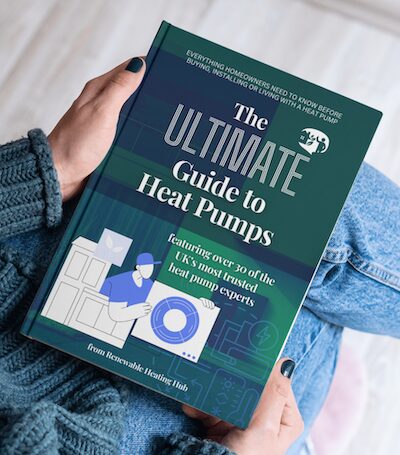Are MCS are finally improving (some of) their guidelines?
Look:
Is this going to be useful guys?
Just trying to move it back into contention.
is it a useful but small step or irrelevant for example?
2kW + Growatt & 4kW +Sunnyboy PV on south-facing roof Solar thermal. 9.5kWh Givenergy battery with AC3. MVHR. Vaillant 7kW ASHP (very pleased with it) open system operating on WC
Encouragement of installers to take account of the emitters must be a good thing. It might make it more difficult for the likes of Octopus to get away with designing around 50C flow temperatures in order to minimise the cost of replacing radiators with bigger ones.
@johnr I think OE argue that the lower running costs associated with a lower flow temperature would take years to offset the cost of using the higher temperatures without the need to replace the original radiators. I don’t know that this idea is the greatest bit of logic ever thought up though! Regards, Toodles.
Toodles, heats his home with cold draughts and cooks food with magnets.
This should be a step in the right direction. One of the biggest shortcomings of the previous method was the reliance on assumed flow temperatures without properly accounting for the impact of different emitters or system design. Using SCoP as a blanket metric often painted an overly optimistic picture of real-world performance, especially in homes with legacy radiator systems that weren’t designed for low-temperature heating.
By incorporating emitter type and property-specific heat loss into the calculation, this update should, in theory, give homeowners a much clearer idea of what to expect in terms of efficiency and running costs. The added warnings around radiator sizing are also welcome… too often, installers assume existing emitters will work fine without verifying whether they can deliver enough heat at lower flow temperatures. This happened to us.
That said, the real test will be in how installers apply these changes. An improved methodology is only as good as the people using it, and there’s always the risk of it becoming another “tick-box exercise” if corners are cut.
It’ll be interesting to see how this plays out and whether the changes lead to better installs or just more paperwork. Fingers crossed it’s the former, but I suspect we won’t see any initial improvements.
On a semi-related note, it’s gone eerily quiet on MCS2.0 which is where the big changes are coming. When I was in touch with their PR team last year they were buoyant and excited about it being unveiled in Jan/Feb 2025. Nothing so far.
Get a copy of The Ultimate Guide to Heat Pumps
Subscribe and follow our YouTube channel!
Posted by: @toodles@johnr I think OE argue that the lower running costs associated with a lower flow temperature would take years to offset the cost of using the higher temperatures without the need to replace the original radiators. I don’t know that this idea is the greatest bit of logic ever thought up though! Regards, Toodles.
It sort of applied to 🐙 installations when they were cheap and TJ himself, Mr 🐙 Heat pump head honcho, explained the capex v running cost ratio thing. I asked him directly. He told me it was a 'middle route'.
But their installations are bigger money now so that justification doesn't really wash any more.
But not only does more radiator volume give lower running costs it is also better for an efficient heat pump and less compressor stops and starts.
The update of MCS 031 has been heavily criticised by many of the better and higher SCOP achieving installers over on LinkedIn, etc. MCS 031 update is intended to close the performance gap between predicted SCOP and actual SCOP. Historically, real-world SCOPs have been significantly lower than predicted. You don't say?!
There are differences in SCOPs between different heat pump manufacturers - some are more efficient than others. The MCS 031 does away with this, putting all heat pumps on an assumed level SCOP. This might not be a bad thing given that some SCOP data published by certain OEMs is very optimistic, and possibly even dishonest. (Not that long ago a Chinese OEM producing units under several branded names sold in Europe was busted filing false data that TuV had signed off without thoroughly checking. Either gross negligence on the part of TuV, or a brown envelope job to turn a blind eye - we'll never know the truth.)
That said, the main reason for predicted vs actual SCOP shortfall is not the heat pump or variance between OEM product SCOPs, it's due to poor hydronic system design and installation - using unsuitable components, thermostats and zone controls. The MCS 031 update does nothing to address this.
So, once again, rather than MCS acknowledging this to be the case, and produce standards and methods that up-skill the installation quality, raise the SCOPs achieved, and lower the energy cost to homeowners, they've just dumbed down the performance estimate, to narrow the delta between predicted SCOP and actual SCOP.
Small wonder most of the better performing retrofit installers think this is a backward and unwelcome step by MCS. They are now obliged to give pre-sale SCOP estimates identical to all other installers. SCOPs that they know their much more efficient & thorough install & control method, which is likely to cost more to install, will exceed. At pre-sale stage, the Heat Geek Gurus are in direct competition with the bodge-it and scarper ex boiler bashers who will marry up a heat pump to a complicated and unsuitable hydronic circuit & control, grab the cash and dash.
MCS 031 update lowers the bar, it doesn't raise it.
I suppose it achieves what it is designed to achieve, namely to protect installers. Just like everything MCS so far as I can tell.
He who pays the piper calls the tune!
4kW peak of solar PV since 2011; EV and a 1930s house which has been partially renovated to improve its efficiency. 7kW Vaillant heat pump.
- 26 Forums
- 2,364 Topics
- 53.6 K Posts
- 116 Online
- 6,027 Members
Join Us!
Worth Watching
Latest Posts
-

Sadly, no, @agentgeorge. The inverter will handle 5kW t...
By Majordennisbloodnok , 8 hours ago
-
RE: New Fogstar 15.5kWh upright solution
@transparent The readings are 0 for amps, 0 ...
By Batpred , 8 hours ago
-

RE: Say hello and introduce yourself
@velcro welcome to the forums. Please feel free start a...
By Mars , 9 hours ago
-
RE: Speedcomfort radiator fans
I watched the video to see whether they'd potentially b...
By Sheriff Fatman , 9 hours ago
-
RE: Mitsubishi Ecodan R290 10kW performance
@ecoste For what it's worth, this is my equivalent data...
By Sheriff Fatman , 10 hours ago
-
Daikin EDLA11D3V3 DHW Settings
I have a newly installed EDLA11D3V3 which I'm still get...
By Velcro , 10 hours ago
-

RE: Setback savings - fact or fiction?
Will come back to the above points, but for now, I've j...
By cathodeRay , 10 hours ago
-

@jamespa I have found that it comes as a shock when we ...
By Toodles , 12 hours ago
-
RE: My Powerwall 3 Consumes 3-4 kWh/Day in Self-Consumption: Is This Normal?
I suspect a good chunk of the "losses" are power consum...
By Bash , 13 hours ago
-

RE: Need Help Optimising My Rushed ECO4 Install: 12kW Bosch Heat Pump
Hi @mickamills . Welcome to the forum. It sounds like...
By bontwoody , 14 hours ago
-
RE: Midea ASHP – how to set weather compensation
@curlykatie did you get sorted with this?
By MickaMills , 14 hours ago
-

RE: External pipework insulation
@transparent I hope you are not being admonished @trans...
By Toodles , 14 hours ago
-
RE: Octopus Cosy Heat Pump Owners & Discussion Thread
The FT levels off at either the set point OR the minimu...
By AndrewJ , 1 day ago
-
RE: MyVaillant Connect Regular Disconnect
Thanks. Yes, if the time is consistently 11pm every nig...
By buckwem , 1 day ago
-
RE: Who's your electricity provider and what's your tariff?
@transparent Thanks, this helps. Could it be that St...
By Batpred , 2 days ago
-
RE: Clivet ASHPs and weather compensation
Simon did share a lot of very helpful advice. On furthe...
By ambris , 2 days ago
-
-
RE: Advice on internal circulation pump noise
Extend the primary branch and make sure you have more t...
By ASHP-BOBBA , 3 days ago






